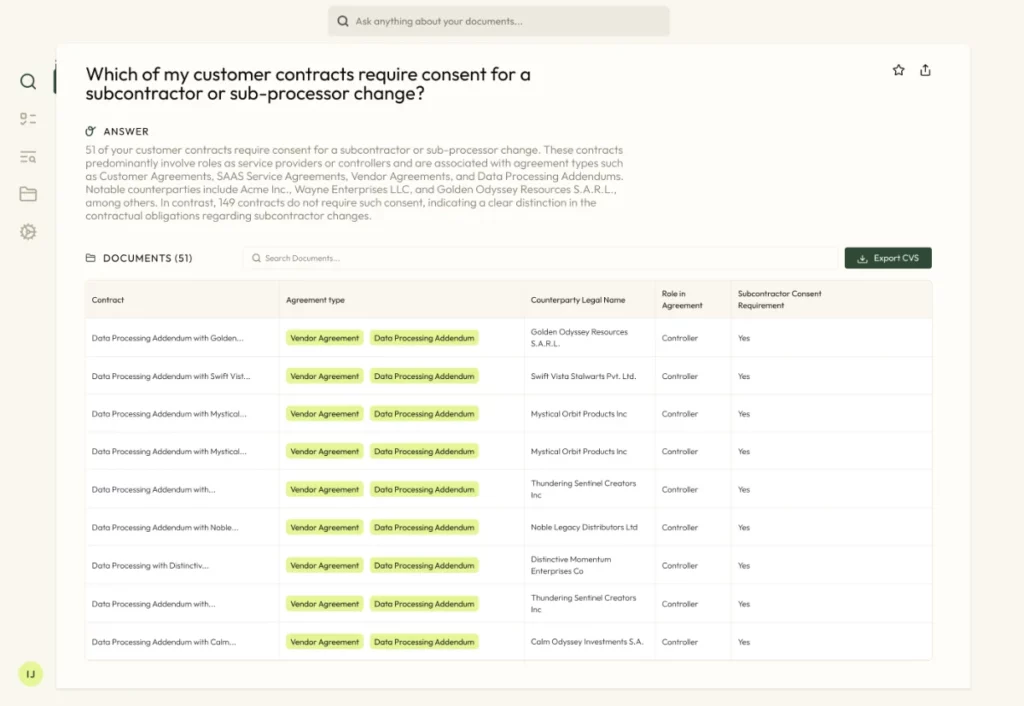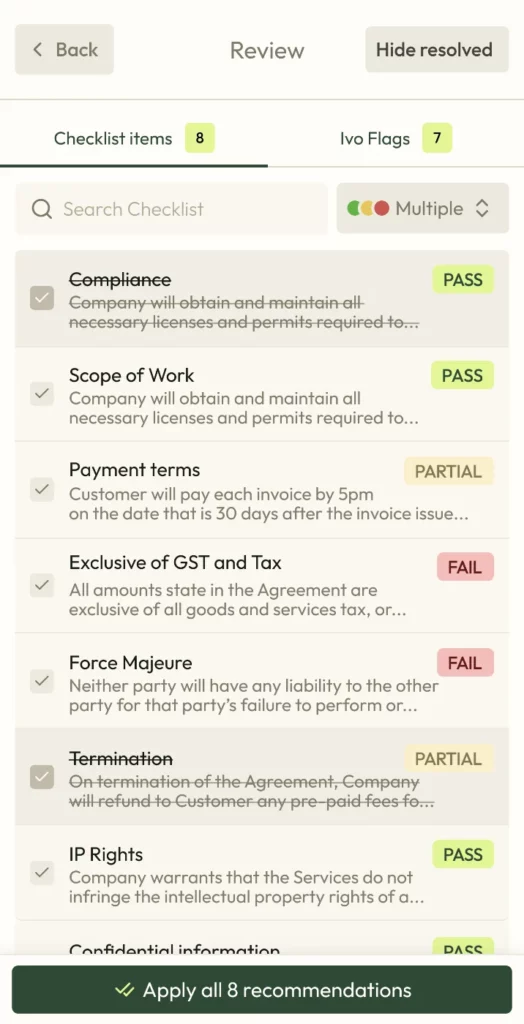Beyond Storage: AI That Turns Contracts Into Business Answers
Discover how AI-powered contract intelligence transforms business, enabling faster decision-making and greater efficiency across legal and operations

Picture this: it’s Tuesday morning, and the CFO needs to know which client contracts include automatic renewal clauses before the board meeting at 2.30pm. Despite having invested $200,000 in a contract lifecycle management system, the legal counsel is still frantically digging through folders, emails and document repositories. The data exists, but the answers remain buried.
This scenario plays out in boardrooms across the world every day. Companies have the contracts, they have the storage systems, but they’re still spending hours hunting for basic information that should be available at their fingertips.
The Storage Trap
We don’t run ads or share your data. If you value independent content and real privacy, support us by sharing.
Traditional CLM systems excel at one thing: keeping contracts organised and accessible. They’re digital filing cabinets with better security and version control. But recent surveys show that up to 90% of contracting professionals still struggle to find contracts when they need specific information quickly.
“What used to take hours of combing through contracts can now happen in a single sentence. This isn’t just faster. It’s foundationally smarter.” – Min-Kyu Jung, Co-founder and CEO of Ivo
The problem isn’t storage – it’s intelligence. Legal teams don’t need another place to keep their documents. They need systems that can actually read, understand and interrogate the content inside those contracts.
Sales representatives spend up to 40% of their time searching for information rather than selling. Procurement teams wade through contract terms manually to understand risk exposure. Legal departments become bottlenecks not because they lack the data, but because extracting actionable insights from that data takes too long.

A Different Approach to Contract Intelligence
This week, Ivo announced two tools that attempt to solve this intelligence problem rather than just adding more storage capacity. The company’s Repository and Assistant platforms , powered by what they call their AI Repository Engine, aim to make contracts interrogable in plain English.
Repository creates dashboards with AI-generated columns that automatically cluster related documents – like amendments to master agreements – and show how deals deviate from standard template positions. Rather than manually tagging contracts or building rigid workflows, the system identifies patterns and relationships across thousands of documents.
Assistant goes further, allowing users to ask questions like ‘Which customer contracts have bespoke data security requirements?’ across multiple storage platforms simultaneously. The system doesn’t just search for keywords – it understands context and contract language well enough to identify meaningful variations from standard terms.
‘CLMs were supposed to solve the problem of extracting true intelligence from contracts, but have overpromised and underdelivered,’ said Jung. ‘Legal teams don’t need another static system of record. They need intelligence at their fingertips – contextual, instant and deeply reliable.’
Beyond Legal Departments
The implications extend well beyond legal teams. When contract data becomes easily accessible, departments across the business can make faster, more informed decisions without creating legal bottlenecks.
Procurement teams can quickly identify suppliers with flexible payment terms during cash flow crunches. Sales departments can understand which contract templates work best for specific client types. Operations teams can spot upcoming renewal dates or compliance obligations before they become urgent problems.
Gartner predicts that by 2027, 50% of procurement contract management will be AI-enabled , with generative AI accelerating contract risk analysis and decision-making processes.
Companies like Canva, Quora and Eventbrite are already using Ivo’s tools, reportedly cutting contract review time by up to 75% without requiring massive retraining projects or complex tagging exercises. The system connects directly to existing platforms like Google Drive and SharePoint, making adoption more straightforward than traditional CLM implementations.
Practical Limitations
This technology doesn’t replace legal expertise – it makes that expertise more efficient. Lawyers still need to review complex negotiations and provide advice. However, as with other AI tools, privacy and compliance concerns need careful consideration when handling sensitive contract data.
When someone needs to know how many contracts include force majeure clauses or which agreements expire in the next quarter, AI can provide those answers instantly rather than requiring hours of manual searching.
Companies with highly bespoke agreements or unusual contract structures may see the greatest long-term benefits once the system learns their unique contract patterns.
Industry Pressure Points
Ivo’s move into what they call ‘AI contract intelligence’ reflects growing pressure across enterprise software to provide answers, not just storage. Forrester’s 2025 CLM research notes a significant industry shift from basic contract repositories to intelligent platforms that embed advanced analytics and automation.
This creates competitive pressure for established CLM vendors to prove their systems can deliver genuine business insights, not just better document organisation. Companies evaluating AI solutions increasingly ask not just where their contracts will be stored, but how quickly they can extract actionable intelligence from them.
Making Contracts Work for Business
For most companies, contracts represent more than legal protection – they contain the operating instructions for customer relationships, supplier arrangements and business partnerships. When that information is accessible and actionable, it becomes a business asset rather than a compliance requirement.
The question isn’t whether AI will eventually make contract data more useful – 95% of procurement decision-makers already believe there’s substantial room for optimisation in their current processes. The question is whether tools like Ivo’s can deliver on the promise of turning contracts from static files into business intelligence that helps companies operate faster and smarter.
If they succeed, the value won’t be measured in storage capacity or document security, but in the time saved when someone needs to know what their contracts actually say – and can get accurate answers without becoming an archaeological expedition.
About Ivo
Ivo is an AI contract review platform founded in New Zealand and now headquartered in San Francisco. The company powers contract review processes for organisations ranging from Fortune 500 companies to one-person legal teams, helping legal and business teams accelerate time-to-close and reduce bottlenecks in key business processes.
Founded on the belief that contracts are foundational to commerce, Ivo was created to address how contract review was slowing down mission-critical projects. The platform uses AI to reduce the time, effort and cost of negotiating contracts, making it easier for businesses to work together. Learn more at ivo.ai or connect with the team on LinkedIn .

